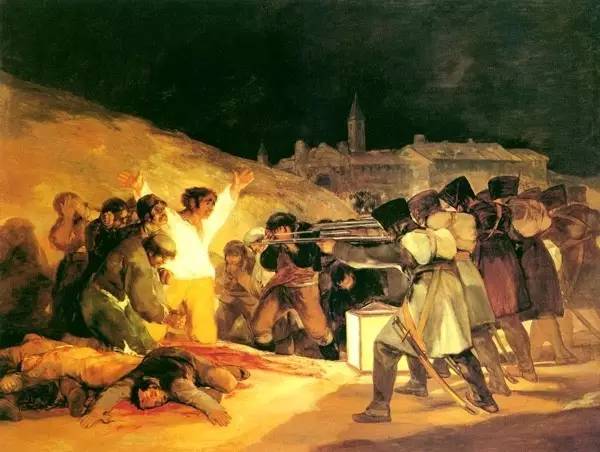帮助与说明
投稿信箱 / bedtimepoem@qq.com
微信号/ dushoushizaishuijiao
总编 / 流马
轮值主编 / 光诸 流马 金楠 冬至 曲木南 楚歌 唐晓丽 老汉
版面值守 / 小排 秋如线 黄璐逸 张看看 小鳜鱼 雪菲 菡纸 Scarrie 肖蕊 卡比丘
声优值守 / 五重 祭祀 张大顺 彭艳戎 格雷斯 小贝 小米 秋的童话 罗小早 雨衣 韬略
声优接引人 / 无语僧
运营 / 范致行
 一九六九年夏天
一九六九年夏天当提防群众的警察用橡皮子弹
向法斯路开火,我只不过是在
马德里遭受强暴太阳的凌辱。
每个下午,在公寓蒸锅般的
酷热中,当我汗流浃背
读完乔伊斯的传记,海鲜市场的腥味
扑鼻而来犹如亚麻坑的恶臭。
感觉就像呆在黑暗角落的儿童,
靠在敞开的窗边的披黑巾老妇,
西班牙运河流出的空气。
我们在平原的星光下一路谈话回家,
那民警的皮制警帽
闪烁如亚麻污水中的鱼肚皮。
“回家吧,”有人说,“向人民靠近。”
另一个从山中招回洛尔迦的亡魂。
我们苦坐着听电视上的死亡人数
和斗牛报道,名人们
从真实事件仍在发生的地方不断到来。
我退到普拉达美术馆的阴凉里。
戈雅《五月三日的枪杀》
盖住了一面墙——那些举起的双手
和反叛者的痉挛,戴头盔
和背包的军队,枪支
扫射的有效斜度。在隔壁
他的梦魇,转移到宫墙之上——
黑色气流,主宰,溃散;农神泰坦
用他自己孩子的血来装饰,
巨人和诸神之战,他蛮横的屁股
在世界之上转动。还有,那河畔低处的决斗,
两个狂暴武士为了荣誉而用棒子
置对手于死地,小腿陷入沼泽,正在下沉。
戈雅用拳头和肘作画,挥舞
他心中染血的斗牛披风,一如历史的控诉。
作者 / [爱尔兰] 谢默斯·希尼
翻译 / 贾勤
Summer 1969
When the Constabulary covered the mob
Firing into the Falls, I was suffering
Only the bullying sun of Madrid.
Each afternoon, in the casserole heat
Of the flat, as I sweated my way through
The life of Joyce, stinks from the fishmarket
Rose like the reek off a flax-dam.
At night on the balcony, gules of wine,
A sense of children in their dark corners,
Old women in black shawls near open windows,
The air a canyon rivering in Spanish.
We talked our way home over starlight plains
Where patent leather of the Guardia Civil
Gleamed like fish-bellies in flax-poisoned waters.
"Go back", one said, try to touch the people."
Another conjured Lorca from his hill.
We sat through death counts and bullfight reports
On the television, celebrities
Arrived from where the real thing still happened.
I retreated to the cool of the Prado.
Goya's "Shootings of the Third of May"
Covered a wall- the thrown-up arms
And spasm of the rebel, the helmeted
And knapsacked military, the efficient
Rake of the fusillade. In the next room
His nightmares, grafted to the palace wall-
Dark cyclones, hosting breaking; Saturn
Jewelled in the blood of his own children,
Gigantic Chaos turning his brute hips
Over the world. Also, that holmgang
Where two berserks club each other to death
For honour's sake, greaved in a bog, sinking.
He painted with his fists and elbows, flourished
The stained cape of his heart as history charged.
Seamus Heaney
1969年8月,一场大规模族群暴动在北爱尔兰的警察和民族主义分子之间爆发。1966年到1972年,希尼在母校贝尔法斯特女王大学任现代文学讲师时期,亲历了北爱尔兰天主教徒为争取公民权举行示威而引起的暴乱。
在诺贝尔文学奖受奖演说中,希尼讲到了北爱尔兰痛苦心灵史上最凄惨的故事之一:1976年某个夜晚,一群下班的工人被蒙面匪徒劫持,对方要求其中的天主教徒站出来,工人中只有一人是天主教徒。工人们都以为匪徒是新教徒恐怖主义分子,这名天主教徒站了出来,他面临的将可能是宗派屠杀。在他站出队列的瞬间,身边的新教徒工友趁着夜色握住他的手并攥了一下,暗示他别动,其他人不会出卖他。为时已晚,天主教徒已经站了出来。但他面对的并不是新教徒恐怖分子,却可能是暂编的爱尔兰共和军成员,子弹从他身边射向了留在队列里的剩余的工人。
“我们所设想的未来,一定是诞生在那位受到威胁的天主教徒在路边感觉到的、另一只手攥住他的手时的收缩之中,而不是诞生在随后的枪声中,如果未来也是所发生事件的伴奏乐中显要的那部分的话。随后的枪声是那么绝对,那么凄凉。”
在1969年夏天,北爱尔兰暴乱时期,希尼在西班牙关注国内事态发展的同时,想到被长枪党枪杀的诗人洛尔迦。在美术馆中,戈雅的画作《五月三日的枪杀》让退到“阴凉中”的希尼无处可躲。暴力冲突总是在人类历史上不断上演,彼此杀戮、伤害,至今未息。
荐诗 / 李小建
2016/06/14
近期评论